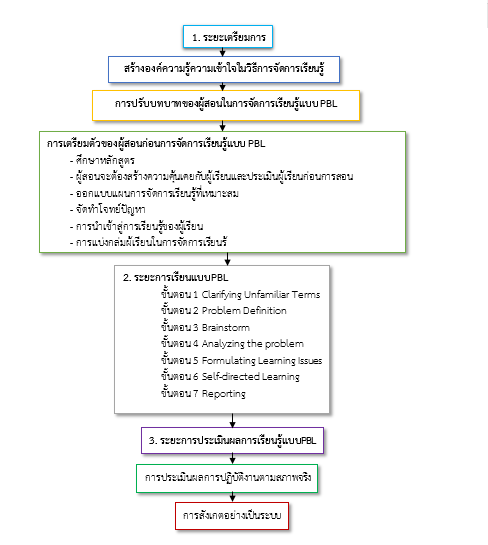แนวทางการจัดการเรียนรู้โดยใช้ PBL สำหรับนักศึกษาพยาบาล
คำสำคัญ:
การจัดการเรียนรู้โดยใช้ PBL, นักศึกษาพยาบาลบทคัดย่อ
การเรียนรู้โดยใช้ปัญหาเป็นหลัก (Problem Based Learning: PBL) คือวิธีการเรียนการสอนที่ใช้“สถานการณ์ปัญหา” เป็นเครื่องกระตุ้นให้ผู้เรียนเกิดความต้องการที่จะใฝ่หาความรู้เพื่อแก้ปัญหา โดยผู้เรียนเป็นผู้ตัดสินใจในสิ่งที่ต้องการแสวงหาความรู้ด้วยตนเองและเรียนรู้ทักษะการสื่อสารที่ดีตลอดจนทักษะการทํางานร่วมกันเป็นทีม โดยผู้สอนคอยอํานวยความสะดวกและมีส่วนเกี่ยวข้องในกระบวนการกลุ่มน้อยที่สุด PBL นับเป็นวิธีการสอนที่เหมาะสมกับการเรียนรู้สำหรับผู้เรียนพยาบาลในการเตรียมพร้อมที่จะทำงานโดยใช้ความรู้ (Knowledge Worker) และเป็นบุคคลที่พร้อมเรียนรู้อยู่เสมอ (Learning Person) ผู้เรียนพยาบาลต้องได้รับการพัฒนาทักษะการคิดอย่างมีวิจารณญาณ การสื่อสาร การปรับตัว การรับฟังความรู้สึกของผู้รับบริการและทำงานร่วมกับผู้อื่นในทีมสุขภาพตลอดจนสามารถให้การพยาบาลแบบองค์รวมบนพื้นฐานการดูแลอย่างเอื้ออาทร ผู้สอนจึงต้องมีความรู้และความเข้าใจการเรียนรู้โดยวิธี PBL ที่ถูกต้องและตรงกันเพื่อให้เกิดผลสัมฤทธิ์ในการเรียนการสอนสูงสุด บทความนี้มีวัตถุประสงค์เพื่อนำเสนอแนวทางการจัดการเรียนรู้โดยใช้ PBL สำหรับนักศึกษาพยาบาล โดยมีแนวทางการเรียนรู้ไว้ 3 ระยะประกอบด้วย 1) ระยะเตรียมการการสร้างองค์ความรู้ความเข้าใจในวิธีการจัดการเรียนรู้แบบ PBL บทบาทของผู้สอน การเตรียมผู้สอน 2) ระยะการเรียนรู้แบบ PBL ประกอบด้วย 7 ขั้นตอน 3) ระยะการประเมินผลการเรียนรู้แบบ PBL โดยการประเมินตามสภาพจริงและการสังเกตอย่างเป็นระบบ ทั้งนี้ แนวทางการจัดการเรียนรู้โดยใช้ PBL สำหรับผู้เรียนพยาบาลควรเตรียมผู้สอน ผู้เรียน และสิ่งสนับสนุนการเรียนรู้และจัดการเรียนรู้อย่างต่อเนื่อง เพื่อพัฒนาการเรียนรู้การคิดอย่างวิจารณญาณจนนำไปสู่การเรียนรู้ตลอดชีวิต
เอกสารอ้างอิง
Ar-yuwat, S. (2017). Problem-Based Learning (PBL): The Challenges of Nursing Education to Foster The 21st Century Learning Nursing. Journal of the Ministry of Public Health, 27(2), 15-30. (in Thai)
Bachelor of Nursing Science Program B.E. (2016). Boromarajonani Nursing Colleage, Songkhla.
FakKhao, S. (2015). 21st Century Skills. [Internet] .2015 {cited 2019 May 9}. Retrieved from http://web.chandra.ac.th/blog/wp-content/uploads/2015/10/21st Century Skills.pdf
Katwibun, D. (2009). Problem-Based Learning Approach (PBL) in Education Research. Journal of Education and Research Volume, 6(1), 14-22. (in Thai)
Ken Masters. (2013). Edgar Dale's Pyramid of Learning in medical education: A Literature Review. Journal Medical Teacher, 35(11), e1584-e1593.
Lekhakula, A. (2015). Problem-Based Learning. [internet] .2015 {cited 2018 Jan 15}. Retrieved from http://teachingresources.psu.ac.th/document/2548/Le_Kha_Kun/PBL.pdf. (in Thai)
Ministry of Education, (1999). National Education Act. Office of the National Education Commission and Office of Prime Minister, Thailand.
Mohamed Ali. W. G. El Sedi. NAM. (2010). Effect of Problem Based Learning on Nursing Students. Approaches to Learning and Their self Directed Learning Abilities. International Journal of Academia research, 2(4), 185-195.
Pailitponganpim, P. (2012). New Future Skills: Education for the 21st Century 21st Century Skills: Rethinking How Students Learn (Editors: James Bellanca and Ron Brandt) Open Worlds PBL.WU Newsletter Walailak University, 5(1), 19 (in Thai)
Puttiwanit, N. (2017). Effect of Problem-Based Learning on Intellectual skills of Nursing Student in Nursing of Persons with Health Problems 1 subject. The Southern College Network Journal of Nursing and Public Health, 4(1), 1-14. (in Thai)
Sanguanthai, K. (2011). Active Learning. PBL. WU Newsletter Walailak University, 4(2), 4-6. (in Thai)
Sirisupluxana, P. (2013). Teaching Nursing Students to Develop Critical Thinking Skills. The Journal of Boromarajonani College of Nursing, Nakhonratchasima, 19(2), 5-19. (in Thai)
Suwannoi, P. (2016). Problem–Based Learning: PBL. [Internet] . Retrieved June 12, 2012 from https://ph.kku.ac.th/thai/images/file/km/pbl-he-58-1.pdf. (in Thai)
Thabet, M. (2017). Effect of Problem Based Learning Management on Critical Thinking Skills of Nursing Students. The Influence of Problem Based Learning on Critical Thinking Skills of Nursing Students. Journal of nursing and education, 5(2), 32-45. (in Thai)
Thiankamsri, K., & Sitisongkrame, S. (2015). Problem-Based Learning on Knowledge of Diabetes Mellitus Care Among Nursing Students. Annual national academic Conferencein 2015: Diversity in Health and Well-Being.
Wanchai, A., Kaewsasri, A., Kuljoo, A., & Vichitkaew, N. (2018). The Effects of the Project Based-Learning on Reflection Thinking’s Behaviors of Nursing Students. Songklanagarind Journal of Nursing, 38(2), 11-19. (in Thai)

ดาวน์โหลด
เผยแพร่แล้ว
ฉบับ
ประเภทบทความ
สัญญาอนุญาต
1. บทความหรือข้อคิดเห็นใด ๆ ที่ปรากฏในวารสารเครือข่าย วิทยาลัยพยาบาลและการสาธารณสุขภาคใต้ ที่เป็นวรรณกรรมของผู้เขียน บรรณาธิการหรือเครือข่ายวิทยาลัยพยาบาลและวิทยาลัยการสาธารณสุขภาคใต้ ไม่จำเป็นต้องเห็นด้วย
2. บทความที่ได้รับการตีพิมพ์ถือเป็นลิขสิทธิ์ของ วารสารเครือข่ายวิทยาลัยพยาบาลและการสาธารณสุขภาคใต้







